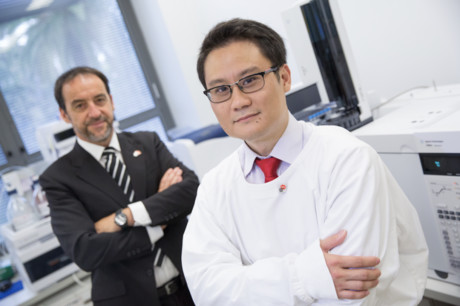Blood biomarker for MS discovered

Australian and French researchers have discovered the first ever blood biomarker for multiple sclerosis (MS), a debilitating disorder of the central nervous system that is caused by the immune system attacking the body.
MS has three recognised forms — relapsing remitting MS, secondary progressive MS and primary progressive MS — each of which has very different outcomes and treatment implications. Traditionally, distinguishing between MS subtypes and confirming diagnosis has been a lengthy and challenging process requiring an array of tests. Now, this process looks set to change.
After 12 years of research, and with the help of a $15,000 incubator grant from MS Research Australia, scientists have developed a simple and speedy blood test that could determine a patient’s specific type of MS with 85–90% accuracy. Led by Dr Edwin Lim and Professor Gilles Guillemin from Macquarie University, their study has been published in the journal Scientific Reports.
“This is a significant discovery because it will facilitate the ability to quickly and simply make a prognosis of the three types of MS and will allow clinicians to adapt their treatment for MS patients more accurately and rapidly,” said Professor Guillemin.
Not only does this research open the possibility of a test to discriminate between the types of MS, but it might also provide key insights into the changes that go on at a cellular level, enabling development of further targeted treatment options for people with MS. As noted by Dr Lim, “The unique information that we will receive from the biomarker within an individual means that it could also be possible to develop biomarker guided personalised treatment for each patient.”
The study is also likely to be integral in understanding the progression of other diseases caused by inflammation and neurodegeneration, including Alzheimer’s, Parkinson’s and motor neurone disease. This is because the test relies on detecting compounds within a biochemical pathway that uses a chemical called tryptophan, which is involved in brain inflammation.
“By increasing our understanding of how our cells process tryptophan, we will be better able to identify its involvement in many types of neurodegenerative diseases,” explained Professor Guillemin.
Professor Guillemin said the researchers are currently developing a prognostic kit with Dr Alban Bessede at ImmuSmol, France, with the support of Australian company Dianti MS. He and his team believe that a clinical blood test kit could potentially be available in as little as two years.
SEQ koala population carries immunity to retrovirus
Koalas from a population north of the Brisbane River appear to have evolved a unique genomic...
RSV immunisation program for babies slashes hospital stays
An Australian-first study has demonstrated the effectiveness of immunisation against respiratory...
A targeted treatment option for psoriasis
New research from MedUni Vienna paves the way for the development of a therapy that not only...




